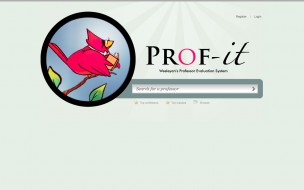
c/o prof-it.org
The Wesleyan Student Assembly (WSA) will launch a new website, designed to rate University professors, called prof-it.org during the first week of the spring semester in January. They hope that the website will serve as another resource for students when making decisions about classes during pre-registration and the drop/add period.
“I think this will be a huge benefit to students,” said WSA President Zachary Malter ’13. “I always find it frustrating when classes don’t meet student expectations, so the goal of the website is to provide information to allow students the chance to make informed decisions about their class selection.”
Members of the WSA first decided to implement this project two years ago. While the proposal received a great deal of support from within the WSA, difficulties with creating and organizing the website have delayed the project. In order to quicken the time needed to develop this project, the WSA hired Chris Sloop ’12 to design the site. Additionally, members of the WSA have also spent time selecting and uploading various classes to be reviewed on the site.
“It’s really been about getting all of these technical details worked out, that’s what’s been drawing this out so long,” said WSA Academic Affairs Committee Chair Mari Jarris ’14. “Also, uploading all of these professors and courses takes a long time — the Academic Affairs committee spent hours last year just uploading courses. We’ve all really wanted this done for a long time, and we’re excited that this is finally happening.”
The website, which is already online and has some reviews posted by WSA members, is set up so that each professor will be reviewed on the classes that they teach. The professors will be reviewed based on the course design, the amount of work, the ease of course, the appropriateness of the evaluations, and textbook usage. It will also specify whether or not attendance is mandatory. The WSA chose to format the reviewing system in this manner in order to depict what type of teaching style each professor uses.
“I’m hoping that the website will not be focused on whether a professor is good or bad,” Jarris said. “Instead it should be whether they facilitate discussion well or will assign heavy workloads and have high expectations. It’s much more about showing the style of teaching.”
Jarris and Malter stated their desire to prevent prof-it.org from becoming too much like ratemyprofessors.com. In particular, they want to prevent any unnecessary or profane comments on the website by monitoring the various student reviews.
“We’re hoping this will be more useful and less petty than ratemyprofessors.com,” Jarris said.
Based on past experiences with websites like ratemyprofessors.com, some faculty members had been hesitant about this project when it was first proposed according to Jarris.
“There was some push-back from the faculty initially,” Jarris said. “Ratemyprofessors has a pretty bad reputation among professors and they didn’t want to see this among Wesleyan students.”
However, more recently, faculty members did not express any complaints about the website. Vice President for Academic Affairs Rob Rosenthal stated that he had nothing significant to contribute on the matter.
Students have expressed support for the project.
“I’m all for it,” said Juliana McLain ’14. “It’s something I think we’ve needed for a long time. We’ve been trying to use ratemyprofessors and other things like that which are not Wesleyan oriented. So finding out more about professors is something that can be helpful to everyone.”
Since many students are still unaware of prof-it.org, the WSA decided to launch a publicity campaign to raise awareness. On Mon. Dec. 5, the WSA will hold a focus group at their weekly meeting which will encourage students to begin submitting reviews to the website in preparation for next semester. During the first week of the spring semester, the WSA plans to use emails, literature distributions, Wesleying posts and other avenues to ensure that students will be made aware of the new site.
“Once we get it out there, we’re hoping students will catch on,” Malter said. “To make this successful will really depend on the students.”
1 Comment
recent wes alum
oh E-squid, how I’ve missed thee…